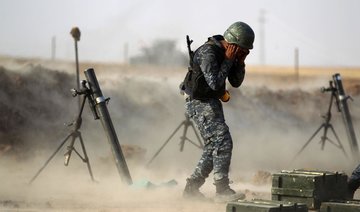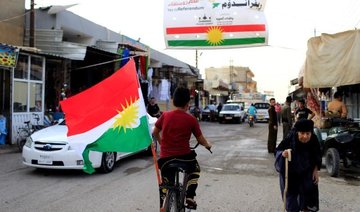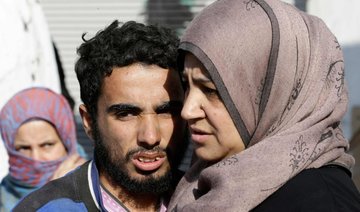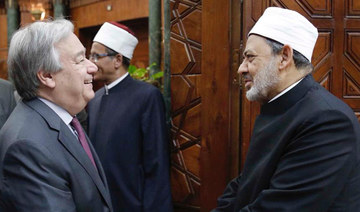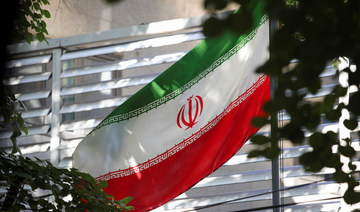AL-OBEIDI, Iraq: For Abu Ahmed, the arrival of Iraqi forces in his village on the border with Syria has ended a three-year ordeal at the hands of the Daesh group that might never have been.
He was only meant to be visiting when he returned to the tiny settlement of Al-Obeidi in eastern Iraq for his mother’s funeral in September 2014.
But two days later the jihadists swept in, trapping him for years under their brutal rule and far from his home in the capital Baghdad.
That all ended this week when government troops pushing a final offensive against Daesh in Iraq seized Al-Obeidi as they closed in on the largest remaining jihadist-controlled town of Al-Qaim just to the west.
“Thank God, the Iraqi forces have liberated us,” he said, refusing to give his real name as “the fear” still remains even though the Daesh fighters might be gone.
After absorbing the village into their self-styled caliphate back in September 2014, the jihadists “behaved badly toward the people,” the man in his 60s says.
In the past few years Iraqi troops have been battling to retake the swathes of territory that Daesh captured when they stormed through the country in 2014.
In brutal fighting Baghdad has ousted Daesh from one city after another as they systematically dismantled the group’s experiment in statehood with the help of air strikes from a US-led coalition.
Now, all that remains of their territory in Iraq is Al-Qaim and the area around in a pocket of barren desert along the Euphrates river near the border with Syria.
Since launching the final offensive to retake the region last week Iraqi troops backed up by local Sunni fighters have captured “over 30 villages and advanced more than 90 kilometers (55 miles),” commander Qassem Al-Mohammedi said.
His men have quickly painted over the Daesh flag that was daubed across an arch at the entrance to Al-Obeidi.
A little further along buildings show the scars of fighting. A row of shops is now only a pile of rubble.
When the fighting started Umm Mohammed thought only of one thing: escaping.
The jihadists “deprived us of everything. There were people who were ill and died in their homes because they refused to let them be moved,” says the woman who also refused to give her full name.
A young girl by her side says she wants to go back to school “now that we are finished with IS.”
“Without school we forgot everything that we learnt,” she said.
Behind them women, children and a few men are crammed onto a long line of pickup trucks with the belongings that they managed to pack in a rush. Sheep, some cows and a donkey are gathered nearby.
Most of the men are seated on the earth waiting to be screened by government forces. They will face questioning and background checks as soldiers look to root out any Daesh fighters.
Several hundred meters (yards) away a sign next to the asphalt road that cuts through the desert points to Al-Qaim 12 kilometers (seven miles) away and Syria further on.
Across the frontier Daesh is also battling for survival as rival offensives backed by the US and Russia eat into its territory.
The Iraqi troops are now focused on Al-Qaim as they look to “force IS out” of their country, said general Noman Al-Zoabi, as he advances through the desert with a convoy of armored vehicles.
Ahead of him lie plenty more obstacles: the road is studded with improvised explosive devices set to explode as his forces advance.
And even in the areas that the troops have “liberated” the threat is still ever present.
Behind on the road near Al-Obeidi smoldered the charred carcass of an Iraqi armored vehicle that had just been blown up by a roadside bomb.
Iraqis hail end of Daesh rule
Iraqis hail end of Daesh rule
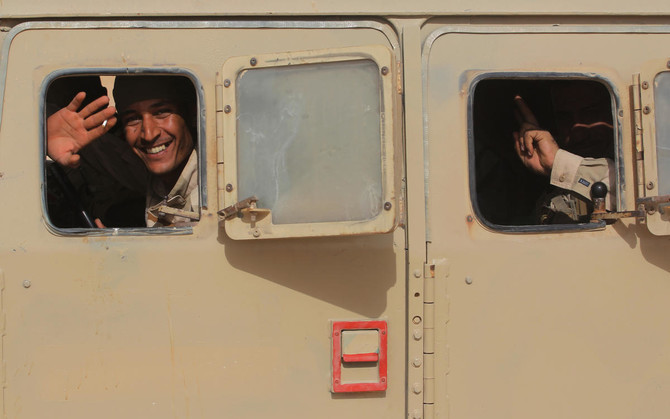
British Royal Navy shoots down missile for first time since Gulf War in 1991 amid Houthi attacks on shipping

- Iran-backed group said its missiles targeted US ship Maersk Yorktown, an American destroyer in the Gulf of Aden and Israeli ship MSC Veracruz
LONDON: A British Royal Navy destroyer shot down a ballistic missile on Wednesday for the first time since the first Gulf War in 1991, the UK’s defense secretary told The Times newspaper.
In a report published Thursday, Grant Shapps told the newspaper that HMS Diamond used its “Sea Viper” missile system to target the weapon, which Yemen’s Houthi militia said they used to target two American ships in the Gulf of Aden and an Israeli vessel in the Indian Ocean.
The Iran-backed group said its missiles targeted US ship Maersk Yorktown, an American destroyer in the Gulf of Aden and Israeli ship MSC Veracruz in the Indian Ocean, its military spokesman Yahya Sarea confirmed.
It is the first such attack from the Yemeni militia in two weeks in the region, where Royal Navy Type 45 destroyers have been deployed to protect commercial ships since the Houthis initiated strikes on global shipping in November last year in solidarity with Palestinians in Gaza.
“The Yemeni armed forces confirm they will continue to prevent Israeli navigation or any navigation heading to the ports of occupied Palestine in the Red and Arabian Seas, as well as in the Indian Ocean,” Sarea said on Wednesday.
Shapps said the latest Houthi attack was an example of how dangerous the world was becoming and how “non-state actors were now being supplied with very sophisticated weapons” from states such as Iran.
His comments came after UK Prime Minister Rishi Sunak this week pledged to increase spending on British defense to 2.5 percent of national income, something Shapps said was “so vital” given continued tensions in the Middle East.
Al-Azhar Al-Sharif condemns terrorist crimes against civilians in Gaza
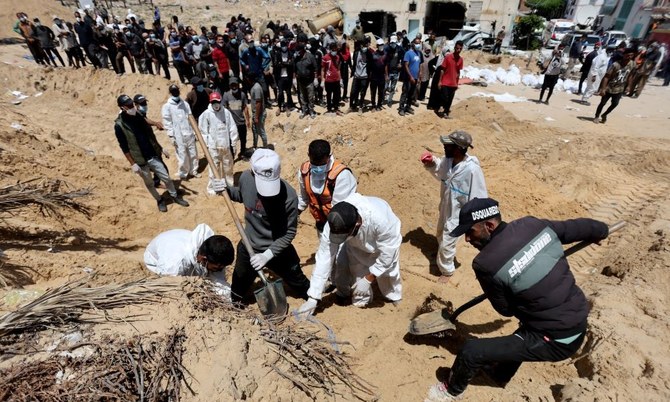
- Al-Azhar Al-Sharif reiterated the need for the international community to assume its responsibilities and put a stop to the ‘frenzied aggression against the people of Gaza’
- Al-Azhar said that the bodies of hundreds of Palestinians, including patients, had been uncovered in mass graves at the Nasser Medical Complex in Khan Younis
CAIRO: Al-Azhar Al-Sharif — Sunni Islam’s oldest and foremost seat of learning — has strongly condemned “the terrorist crimes being committed against civilians in the Gaza Strip.”
In a statement, Al-Azhar censured the attacks, “the hideousness of which was revealed through the widespread reports about mass graves of hundreds of bodies of children, women, the elderly, and medical personnel in the vicinity of the Nasser and Al-Shifa Medical Complexes.
“Also, dozens of bodies were found “scattered” in shelter and displacement centers and tents, and residential neighborhoods throughout the Strip.”
Al-Azhar said that it affirmed to the world that “these mass graves are the definitive proof that these hideous atrocities and horrors have become normal daily behavior for Israel.”
It said that the people of the world must unite to protest in a way that deterred the regimes supporting these crimes.
Al-Azhar demanded an urgent international trial against “the terrorist occupation government, which no longer knows the meaning of humanity or the right to life and is committing genocides every day.”
It reiterated the need for the international community to assume its responsibilities, stop the “frenzied aggression against the people of Gaza and the consequent suffering and unprecedented humanitarian disasters, and ensure the protection of civilians and the delivery of sufficient and sustainable humanitarian aid to all parts of the Gaza Strip.”
Al-Azhar expressed its “sincere condolences and sympathy to the Palestinian people and the families of the martyrs, calling on the Lord Almighty to shower them with His vast mercy and forgiveness, to reassure the hearts of their families and loved ones, and to speed up the recovery of the sick.”
Citing media reports, Al-Azhar said that the bodies of hundreds of Palestinians, including patients, had been uncovered in mass graves at the Nasser Medical Complex in Khan Younis since Saturday.
New UK sanctions target Iranian drone industry
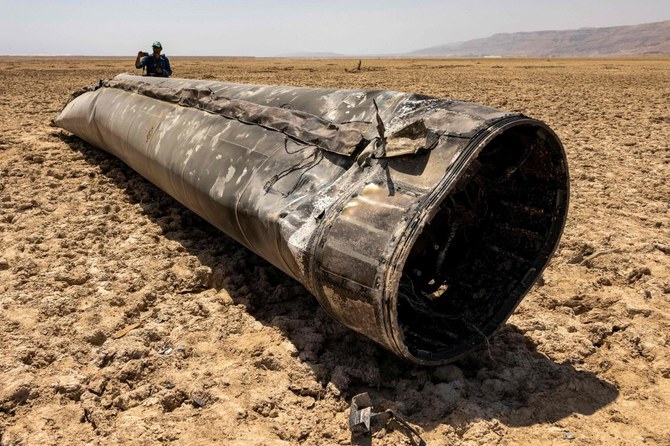
- The measures, taken in co-ordination with the US and Canada, target four businesses and two directors at a network of drone companies
LONDON: Britain on Thursday announced new sanctions targeting Iran’s military drone industry, in response to Iran’s drone and missile attack on Israel earlier this month.
The measures, taken in co-ordination with the US and Canada, target four businesses and two directors at a network of drone companies with the aim of limiting Iran’s ability to launch drones.
“The Iranian regime’s dangerous attack on Israel risked thousands of civilian casualties and wider escalation in the region,” British Foreign Secretary David Cameron said in a statement.
“Today the UK and our partners have sent a clear message – we will hold those responsible for Iran’s destabilising behavior to account.”
Britain also said it would introduce new bans on the export of drone and missile components to Iran, seeking to limit its military capabilities.
Last week, Britain imposed sanctions on Iranian military figures and organizations, in another coordinated move with the United States, following Iran’s action against Israel.
Iran launched drones and fired missiles at Israel on April 13 as a retaliatory strike for the attack on its embassy compound in Damascus two weeks prior, raising the risk of further escalation in conflict in the Middle East.
Egypt, Dutch leaders discuss Gaza ceasefire efforts

- Rafah assault ‘will have catastrophic consequences on regional peace and security,’ El-Sisi warns
- Egypt’s president and the Dutch prime minister agreed on the urgency of working toward reaching a ceasefire
CAIRO: Egypt’s President Abdel Fattah El-Sisi has discussed efforts to reach a ceasefire in Gaza with Mark Rutte, prime minister of the Netherlands.
During a phone call from Rutte on Thursday, the Egyptian leader warned that any Israeli assault on Rafah will have “catastrophic consequences” for the humanitarian situation in the enclave.
The leaders discussed bilateral relations, and ways to enhance cooperation across various political and economic levels consistent with the current momentum in Egyptian-European relations.
Ahmed Fahmy, presidential spokesman, said the call also focused on the situation in Gaza, and Egypt’s efforts to restore regional stability by reaching a ceasefire and providing access to humanitarian aid.
El-Sisi reiterated the crucial importance of ending the war, warning against any military operations in the Palestinian city of Rafah, which will have catastrophic consequences on the humanitarian situation in the strip and on regional peace and security.
The Egyptian leader underscored the need for the international community to assume its responsibilities to implement the relevant UN resolutions.
Egypt’s president and the Dutch prime minister agreed on the urgency of working toward reaching a ceasefire, and ensuring the flow of adequate humanitarian aid to all areas of the Gaza Strip in order to protect it from a humanitarian catastrophe.
They also emphasized the need to move toward implementing the two-state solution, which would restore regional stability, and establish security and peace in the region.
In March, El-Sisi received Rutte to discuss bilateral relations, regional developments, and Egypt’s efforts to reach a ceasefire and offer humanitarian assistance in Gaza.
Lebanon postpones local elections again as violence rocks south

- Lebanon is supposed to hold municipal elections every six years
- Parliament approved “extending the existing municipal and elective councils’ mandate until a date no later than May 31, 2025,” despite objections from lawmakers opposed to Hezbollah
BEIRUT: Lebanon’s parliament on Thursday delayed municipal elections for a third time in two years, state media reported, as militants in the country’s south exchanged near-daily fire with Israel for over six months.
The powerful Iran-backed Hezbollah group has been trading fire with Israeli forces across the border since the day after its Palestinian ally Hamas carried out a deadly attack on Israel on October 7, triggering the ongoing war in the Gaza Strip.
Lebanon is supposed to hold municipal elections every six years, but cash-strapped authorities last held a local ballot in 2016.
Parliament approved “extending the existing municipal and elective councils’ mandate until a date no later than May 31, 2025,” despite objections from lawmakers opposed to Hezbollah, said the official National News Agency.
The bill cited “complex security, military and political circumstances following the Israeli aggression on Lebanon” and especially its south, near the border, as reasons for the delay.
Lawmakers did not set a new date for the elections, initially scheduled for 2022.
Local councils help provide basic services to residents, but their role has declined as state coffers ran dry after Lebanon’s economy collapsed in late 2019.
Parliament Speaker Nabih Berri had previously said southern Lebanon could not be excluded from any upcoming ballot, after the Christian Lebanese Forces, the main party opposing Hezbollah, insisted on holding the polls on time.
More than 92,000 people have been displaced from their homes in Lebanon due to the violence, as have tens of thousands of residents of Israeli communities across the border.
Since violence began along the Israeli border on October 8, at least 380 people have been killed in Lebanon, including 72 civilians, according to an AFP tally.
Israel says 11 soldiers and eight civilians have been killed on its side of the border.
In April 2023, the Lebanese parliament had already postponed municipal elections as the deputy speaker warned holding them was “almost impossible” for the cash-strapped country after years of economic meltdown.
Lebanon has faced the prolonged financial crisis and months of border clashes essentially leaderless, without a president and headed by a caretaker government with limited powers amid deadlock between entrenched political barons.


